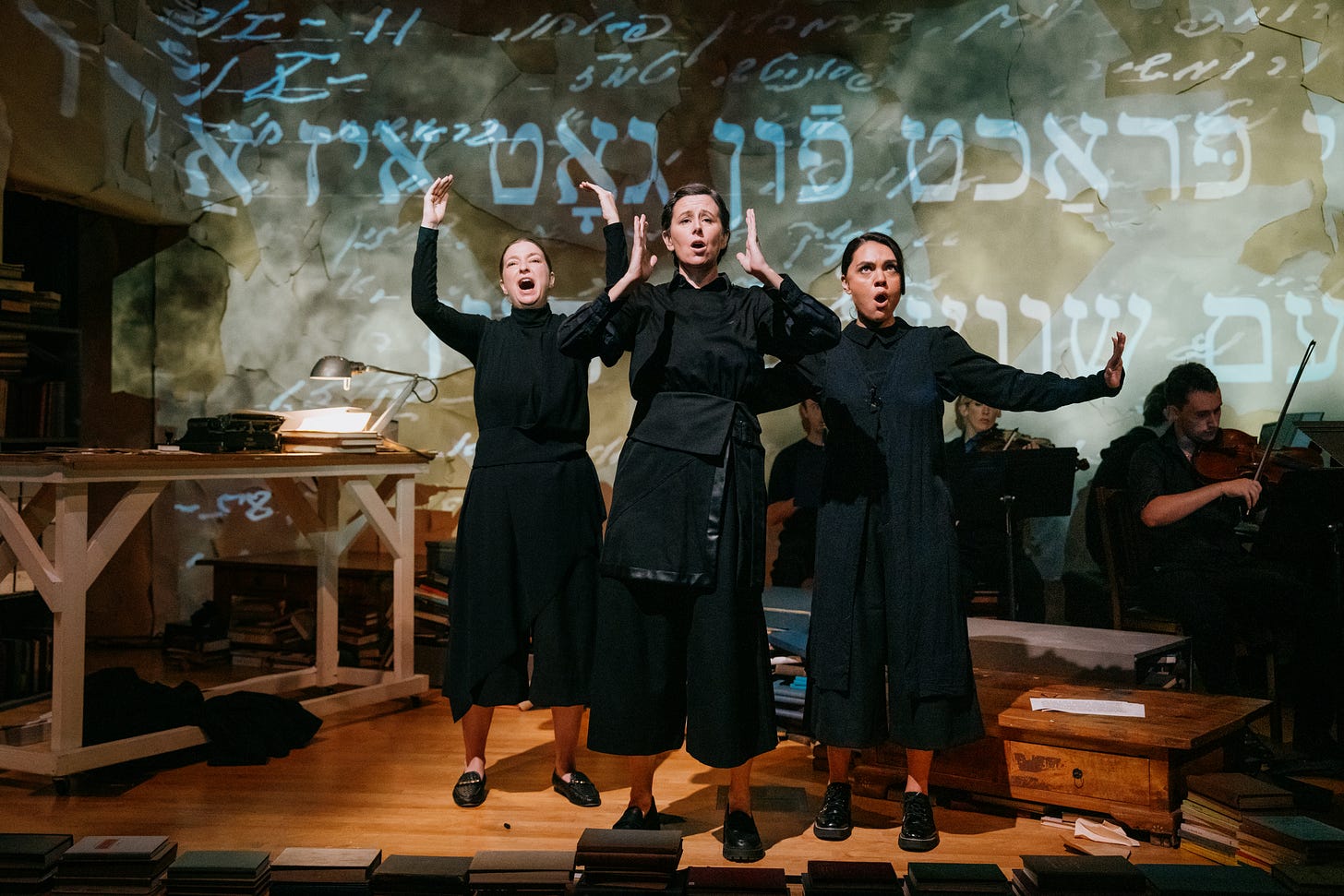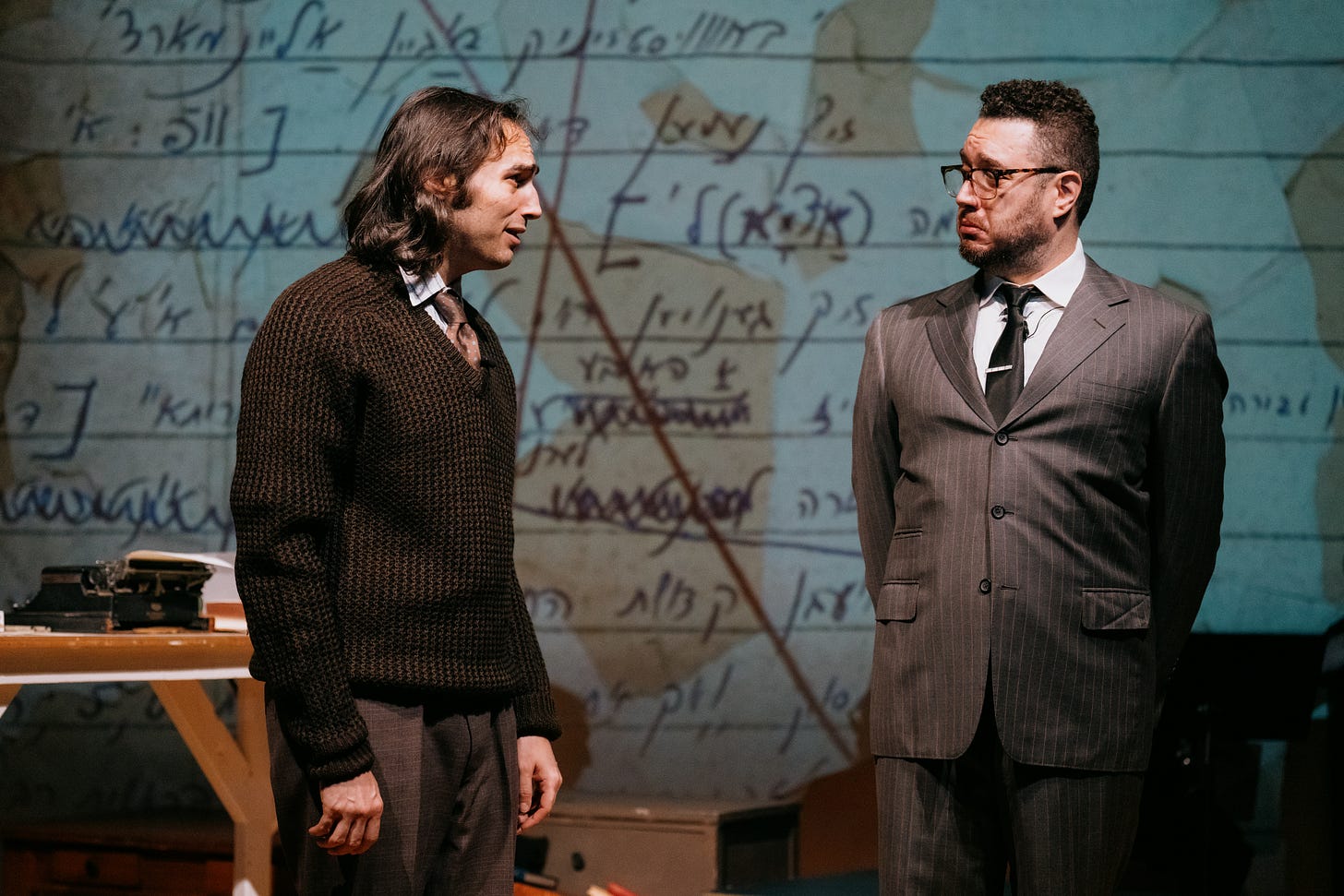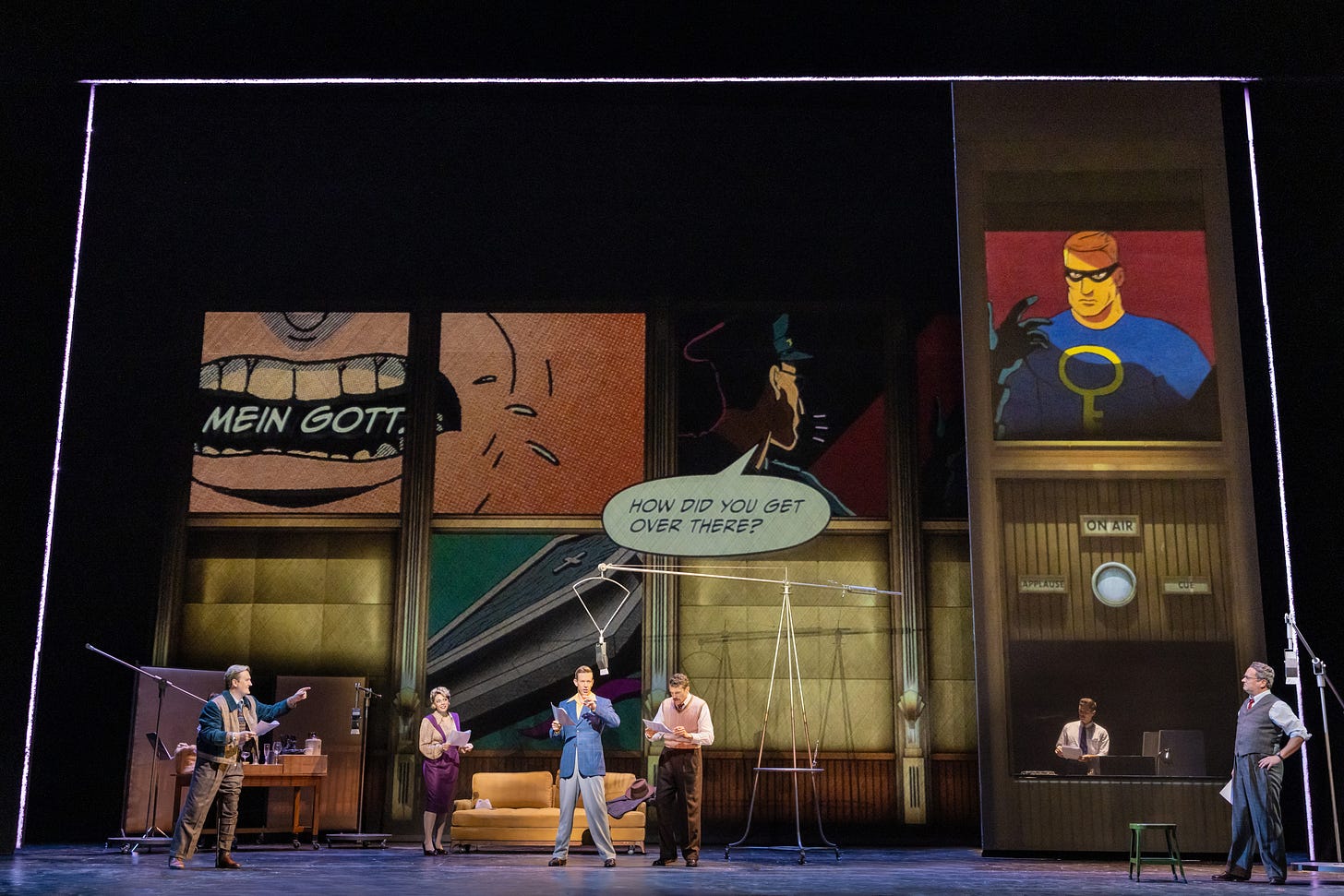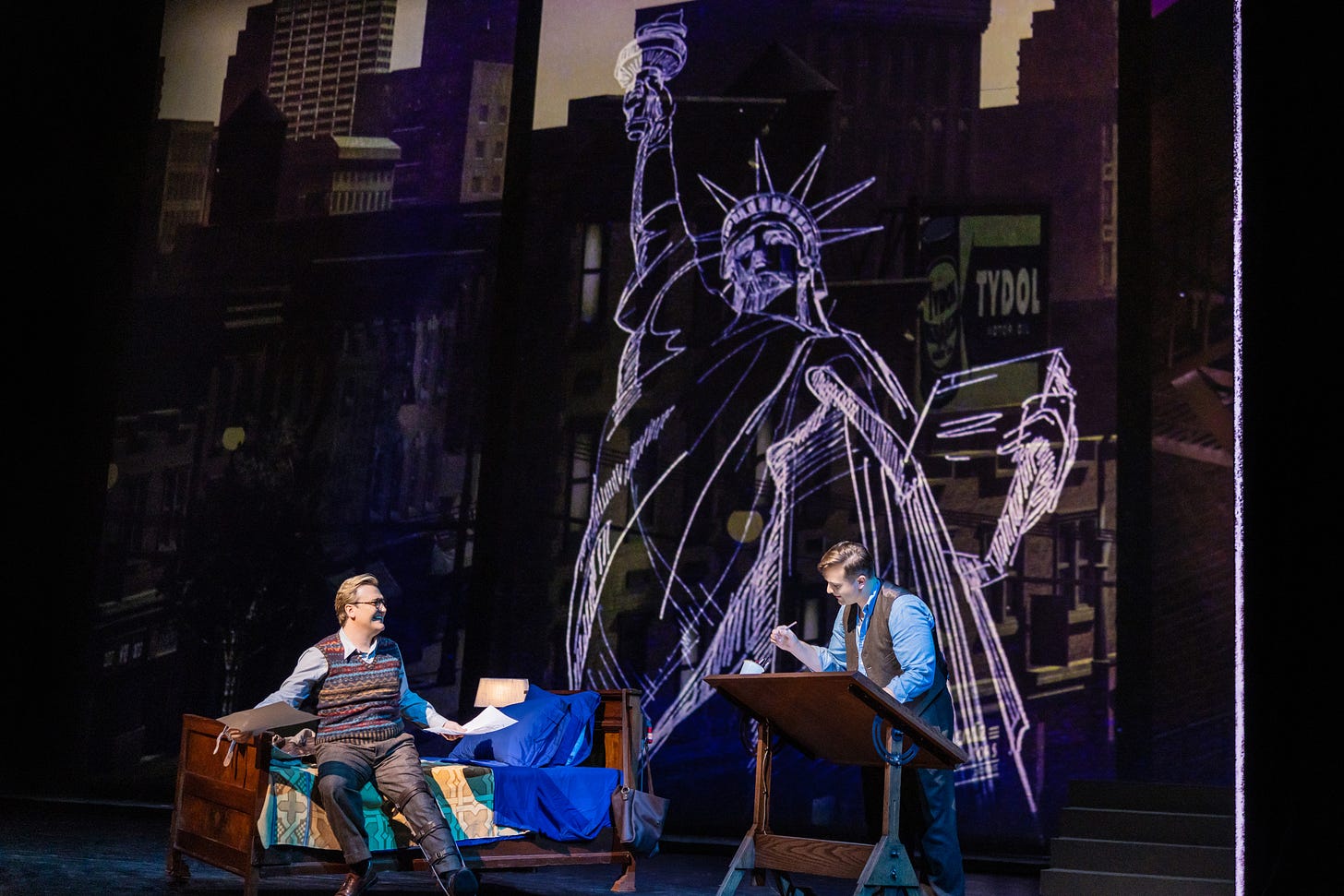Words, Visions and Tunes
"The Great Dictionary of the Yiddish Language" at YIVO, "Kavalier and Clay" at the Met Opera and the tenor Pene Pati at the Park Avenue Armory
Oct 05, 2025

Kristin Gornstein, Kate Maroney and Kelly Guerra as the three Alefs in “The Great Dictionary of the Yiddish Language.” Photo credit: Brian Hatton
The Merriam-Webster Collegiate Dictionary was updated last month to include a plethora of post pandemic words, including dumb phone, WFH and doomscrolling. I’m so addicted to the latter that I frequently rely on an an app blocker called Freedom, which stops me in my tracks whenever I reach for my doom fix. The students in my advanced ESL class weren’t familiar with the word doomscrolling but immediately identified with the concept. It came in handy for our class last week on gerunds. Doomscrolling is bad for your health.
I’ll admit I wasn’t familiar with some of the other 6,212 (!) new words, phrases and meanings recently added to the Cambridge Dictionary, including skibidi, delulu and lewk. I like delulu, which originated circa 2010 among K-pop fans to describe someone with delusional love interests. Apparently ‘delulu is the solulu’ is the new ‘fake it till you make it’ on TikTok.
The Lithuania-born linguist Yudel Mark, editor in chief of The Great Dictionary of the Yiddish Language might have been jealous of these updated dictionaries: his quest to create a comprehensive Yiddish dictionary never came to fruition. He died in 1975 after completing multiple volumes featuring entries under Alef, the first letter in the Hebrew‐Yiddish alphabet. (About 20 percent of Yiddish words begin with Alef.)

The Great Dictionary of the Yiddish Language, a new chamber opera by Pulitzer Prize finalist Alex Weiser, is inspired by this story and the real life conflict between Mark and Max Weinreich, director of the YIVO Institute for Jewish Research in Manhattan, where the two men worked on the dictionary in the 1950s. Both men wanted to save the Yiddish language after most of its speakers had perished in the Holocaust, but they couldn’t agree about the scope of the dictionary and argued over everything from spelling rules to both anachronistic and new words. (Presumably there would have been some bickering over the Yiddish equivalent of ‘delulu is the solulu.’)
I saw the matinee performance of The Great Dictionary on Sept 21st at YIVO. Rebecca Miller Kratzer directed the 50-minute opera, which has a libretto by Ben Kaplan and is scored for small ensemble (piano, clarinet and string quintet) and five singers, including three mezzo sopranos who represent different forms of the letter Alef. In an imaginative bit of dramatic license, they appear in a vision before Mark, singing in Yiddish and urging him to resurrect Yiddish words and “blow in them a breath of life.”
The score, free of Klezmer clichés, features tuneful, Sondheim-esque arias interspersed with striking, harmonically pungent sections for the Alefs. The two protagonists, the tenor Jason Weisinger as Yudel Mark and the baritone Gideon Dabi as Max Weinreich, were excellent, vividly illuminating the fraught relationship between the two men. It’s a taut, impactful chamber opera and I hope it’s performed again.
I then headed uptown for opening night at the Metropolitan Opera for a very different work about WWII era Jews in New York. The Amazing Adventures of Kavalier & Clay has a score by Mason Bates and libretto by Gene Scheer, adapted from Michael Chabon’s Pulitzer Prize–winning novel of the same name about two Jewish cousins who launch a comic-book series with an anti-fascist superhero. The action moves between Nazi-occupied Prague, New York City and comic-book fantasy.

A scene from “The Adventures of Kavalier & Clay.” Photo: Evan Zimmerman / Met Opera
The story of the dueling Yiddish linguists is straightforward enough but Chabon’s sprawling novel is harder to condense. Scheer – who expertly turned Melville’s Moby Dick into an opera – manages to trim Chabon’s story into cohesive scenes. There were commendable performances from the baritone Andrzej Filończyk (as Czech refugee Joe Kavalier), the tenor Miles Mykkanen (as the Brooklyn writer Sam Clay) and the mezzo-soprano Sun-Ly Pierce (as Rosa, Joe’s girlfriend).
One review described the opera as “unabashedly tonal.” In 2007, a lifetime ago, I reviewed an orchestral piece by the proudly melodic composer Jennifer Higdon for the NYT and wrote:
Given that composers now enthusiastically write in wildly diverse idioms, calling a piece “unabashedly tonal” seems almost as odd as referring to a work as “bashfully dissonant.”
A quick google search revealed that ‘unabashedly tonal’ is still very much a thing in 2025. Higdon proves that you can be tonal and interesting. Bates, who moonlights as a techno DJ, has written a cinematic score that isn’t particularly memorable, although there are plenty of ear-catching elements, including his use of electronics. The lead singers have soaring arias, although I certainly didn’t come away humming any tunes. I loved the high tech, imaginative staging, featuring projections by 59 Studios and directed by Broadway dynamo Bartlett Sher.

Miles Mykkanen as Sam Clay and Andrzej Filończyk as Joe Kavalier in “The Amazing Adventures of Kavalier & Clay.” Photo: Evan Zimmerman / Met Opera
On Sept 26th, I enjoyed hearing the Samoan tenor Pene Pati, a former rugby player, perform French, German and English songs during his New York recital debut at the Park Avenue Armory. I interviewed him for Opera Magazine before his performance as the Duke in the Met’s Rigoletto last year. He told me that his choir teacher and coach in New Zealand, where he grew up, wanted to bridge the gap between sports jocks and choir boys.
In both disciplines, you have to be committed to trainings and practice. You have to keep physically fit and vocally fit….The entire rugby team sang in the choir and still this day a lot of my friends still sing in community choirs. The sport was the physical outlet and the music side was the emotional outlet.
When he performs, Pati always wears a necklace with the Pounamu, the New Zealand greenstone, as a way of feeling close to friends and family back home. He ended his recital with a Samoan song about feeling homesick.
If you need something something light and tuneful to jolt you from your doomscrolling, listen to Serenata a Napoli, featuring Pati’s fresh, tender takes on hits like ‘O sole mio’ and ‘Funiculì funiculà,’ as well as lesser known songs. String players from the baroque ensemble Pomo d’Oro accompany him with delicate, elegant playing. It’s a far cry from the ‘belt it out’ operatic renditions of these songs often heard.
Last night I went back to the Armory for a microtonal night: Georg Friedrich Haas’s 11,000 Strings, which featured 50 pianos all tuned differently. It was extraordinary. More to follow. Stay tuned!


